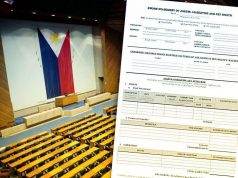Public opinion survey respondents not competent
The Social Weather Stations (SWS) latest report that 76% of Filipinos see many human rights abuses in President Duterte’s war on illegal drugs and that 78% of Filipino adults believe the accusation that there are “ninja cops” among members of the police force raised many a curious eyebrow. To political pundits, SWS’ findings seem to go against the results of past SWS surveys that show that a great majority of the population find President Rodrigo Duterte’s performance satisfactory. An earlier survey showed that 93% disapprove of his inaction towards Chinese aggression in the West Philippine Sea.
How can people find his performance satisfactory when the same people say his centrepiece program has gone awry, the political observers ask. The seeming contradiction between the high rating of President Duterte’s performance and the poor assessment of his programs and policies caused netizens to overwhelm social media with negative comments about SWS itself and about its survey method. Some netizens say SWS has been co-opted by the President. I do not think so. Mahar Mangahas’ academic and professional credentials leave no doubt about his integrity. I met Mr. Mahar Mangahas of SWS at a BusinessWorld anniversary party, I think in 2005. I never saw or talked to him since then. I was invited to the 2020 Survey Review last Thursday. Much as I wanted to attend to be able to share my thoughts on SWS surveys with him, I could not go. The thoughts I wanted to share with him are the subject of this article.
I have no doubt about the integrity of SWS surveys either. I do know its survey method is in accordance with accepted general practice in the field of public opinion. That is why its election projections have been borne out by the actual results of the general elections.
Some say the survey respondents are not truly representative of the population. I was with Robot Statistics, the country’s first independent public opinion pollster/market research firm and Gallup affiliate, in the early 1960s. It was my first job. I learned then how respondents to public opinion polls are drawn at random so that the entire lot is representative of the voting population. SWS draws its respondents the same way.
I say that precisely because the respondents are truly representative of the entire voting population that a contradiction between the respondents’ positive perception of the President’s performance and their negative assessment of his programs and policies surfaces. The great majority of the respondents are not competent to pass judgment on the performances of public officials and government institutions.
SWS usually interviews 1,200 respondents for its public opinion surveys. It uses the Philippine Statistics Authority (PSA) population figures broken down by socio-economic classes. According to the PSA, the Philippine population breaks down into 1% AB, 9% C, 60% D, and 30% E. If the sample of 1,200 respondents is representative of the voting population, as it should be, then only 12 respondents come from the socio-economic class AB and 108 from Class C. The bulk of the interviews therefore come from among the lower socio-economic classes — 720 from class D and 360 from class E.
SWS describes the AB socio-economic class as the most affluent group. It refers to the C class as the middle class whose lifestyles reflect comfortable living, the D class as the Lower Class who basically thrive on a hand-to-mouth existence, and the E class as the Extremely Lower Class who face great difficulties in meeting their survival needs.
Maybe it can be safely said that based on their circumstances in life, the highest educational attainment of the 1,080 respondents from the Lower Classes do not go beyond Grade 6. Their main source of information regarding the national government must be the broadcast media. They may not own a TV set or a radio, but there is always someone in their neighborhood who has his TV set or radio turned on at high volume for everybody to hear what is being aired.
The usual wording of the question asked in surveys about the President’s performance is as follows: “Are you very satisfied, somewhat satisfied, undecided if satisfied or dissatisfied, somewhat dissatisfied, very dissatisfied, or you have not ever heard or read anything about Rodrigo Duterte?”
Each respondent interprets the question from his own viewpoint. The understanding of a respondent from socio-economic Class AB who would have gone to college would be different from that of a respondent from Class DE who would not have gone beyond grade school. As 90% of the respondents come from Class DE, their frame of reference when asked about the performance of the President could be the performance of something unrelated to governance, like his long speeches spiced with racy adlibs or his expletive-laden tirades against the fabulously rich and Catholic Church dignitaries or his presence in calamity areas.
It is not improbable that a number of respondents do not understand the question at all and simply choose from possible answers presented them one they feel is a safe answer, like what they think the interviewer wants to hear or what would please the President himself.
In contrast, the questions on the war on drugs are more specific on the frame of reference. They are:
1. How much do you agree or disagree with this statement: “The removal as ICAD Co-Chairperson of Vice-President Leni Robredo, who is in the political opposition and has been a critic of the administration’s war on illegal drugs, is an admission by the administration that its war is failing?”
2. In your opinion is Presiddent Duterte: definitely sincere; somewhat sincere somewhat insincere; definitely insincere in appointing Vice-President Leni Robredo as Co-Chairperson of ICAD?
3. Compared to July 2016, when Rodrigo Duterte became President, would you say that the present number of users of illegal drugs has risen a lot, risen somewhat, stayed the same, fallen somewhat, or fallen a lot?
4. In the course of the administration’s war on illegal drugs, would you say that the number of abuses of human rights, for example the Extrajudicial Killings or EJKs, has been very many, somewhat many, only a few, or very few?
The question on “ninja cops” is also specific. “Do you believe or not believe that accusation that there are ‘ninja cops’ or police who allegedly sell illegal drugs that they confiscate during their operations?”
To extract more accurate information about the people’s opinion of the performance of the President, a number of questions may be required. In addition to the first question on the degree of satisfaction about the President’s performance, the following open questions (not multiple choice) may have to be asked:
1. What makes you feel the way you do about the president’s performance?
2. Can you cite the act of the president you are most satisfied with?
The same questions may have to be asked in surveys on the performance of the vice-president, Senate president, and speaker of the House of Representatives.
During episodes of DZMM TeleRadyo series last year on senatorial candidates, the station’s field reporters asked ordinary folks in the streets who they would vote for senator. Many said they would vote for candidates who can provide them benefits like jobs or livelihood, or access to the government housing program. Others said they would choose candidates who can do them a favor like assistance if and when they have to deal with government offices or when in conflict with the law. Such answers implied that most of the respondents of DZMM’s random survey do not know what the function of a senator is.
It can be safely assumed that the overwhelming majority of the respondents of SWS surveys perceive a senator the same way the DZMM Teleradyo interviewees do. I am certain they do not know what the function of the Senate president, and for that matter the Speaker of the House, is.
If the common folks do not know what the real role of the Senate is in spite of the wide and frequent mass media exposure the chamber gets, how much more ignorant are the folks about the functions of the Supreme Court and the Cabinet as what these two institutions do are not given the same exposure that the work of the legislative bodies is given.
In surveys on the Supreme Court, the question “What decision of the Supreme Court are you most satisfied with?” may have to be asked. With regard to the Cabinet, these two questions may have to be added to the questionnaire:
1. What decision of the Cabinet are you most satisfied with?
2. Who among the Cabinet members whose performance you are most satisfied with?
On the Supreme Court, can you add: What decision of the Supreme Court are you most satisfied with?
The addition of open questions in various SWS public opinion surveys will determine if the respondents are competent to weigh in on public issues, and in turn determine the usefulness of those surveys.
Oscar P. Lagman, Jr. is a retired corporate executive, business consultant, and management professor. He has been a politicized citizen since his college days in the late 1950s.



